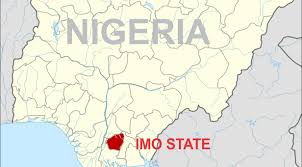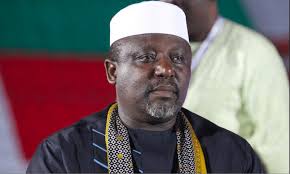This post became necessary after listening to Emeka Etiaba SAN confirming in a recent “Politics Today” Channels Television Live interview that, on behalf of PDP, he has approached the Federal High with an Originating Summons seeking judicial interpretation of section 183 of the 1999 Constitution as amended and also asking for certain consequential orders including ouster or sack of Governor Buni as Governor of Yobe State for doubling as Caretaker Committee Chairman of APC.
In that interview he granted from London, Learned Senior Counsel, confirmed that PDP will want the Court to declare that by doubling as Caretaker Committee Chairman of APC, Governor Buni is deemed to have abandoned his office as elected Governor of Yobe State.
Among other things, he said that he was careful not to discuss the merits of that case now in court as that would be sub judice.
The “sub judice rule” means that when a matter is in court or under the consideration of a court, public discussion of the matter is prohibited. It is contemptous of the court to do so and it is punishable.
Therefore, leveraging on PDP’s lead Counsel’s guided comments, this intervention will also be careful not to discuss the merit or demerit of the said case in court. It will also not hold brief for any of the sides in the matter but in the interest of enlightenment of the citizenry on constitutional issues, it will take liberty to pinpoint certain constitutional posers which the present suit has thrown up and which germane issues the court may be required to resolve before deciding the case one way or the other.
- The first issue is interpretation of the provisions of section 183 of the 1999 Constitution as amended and determining the consequences for its breach.
Section 183 of the 1999 Constitution disqualifies a Governor from other jobs by providing that “The Governor shall not, during the period he holds office, hold any other executive office or paid employment in any capacity whatever”.
By presenting this unambiguous provision of section 183 of the 1999 Constitution as amended for interpretation, PDP is inviting the court to determine whether the Office of a Caretaker Committee Chairman of APC, a political party, is an “executive office” or whether it is “a paid employment in any capacity” or both meaning (“an executive office” and “a paid employment” at the same time) and to resolve same against the serving Governor of Yobe State.
Sadly, what an “executive office” means or what constitutes “paid employment in any capacity whatsoever” is not explained either in the entire gamut of the 1999 Constitution and or particularly in the Interpretation section 318 of the 1999 Constitution as amended.
Furthermore, section 183 of the 1999 Constitution as amended does not provide any punishment(s) or consequence(s) for breach of its mandatory provision (the words “shall not” is used) that a serving Governor is disqualified from holding any other executive office or paid employment in any capacity whatever.
In the light of the foregoing, he who alleges must prove.
It is public knowledge that Governor Buni is both Governor of Yobe State and Caretaker Committee Chairman of APC but is the later (Careraker Committee Chairman) an “executive office” or a “paid employment” in terms contemplated under section 183 of the Constitution?
Thus, the party (PDP) alleging breach of any limb or combination of the two limbs of breaches contemplated in section 183 of the 1999 Constitution must offer proof of the alleged breach(es) and the court will thereafter be able to interprete same.
This will not be in isolation against the backdrop that section 177(c) of 1999 Constitution as amended provides that one of the qualifications for election as a Governor is that the person must be a member of a political party and is sponsored by that political party.
The Court will also be considering the applicability or otherwise of the immunity clause contained in section 308 of the 1999 Constitution as amended restricting legal proceedings against a Governor of a State.
- The second key issue is the procedure for removal of a Governor of a State from office.
The question of how a Governor can be removed from office and by which authority or body will also come up in this suit in the event that the Court holds that section 183 of the Constitution was breached by the Governor of Yobe State when he became Caretaker Committee Chairman of APC.
It must be accentuated that if the Court does not hold that section 183 of the 1999 Constitution was breached, there will be no need for consideration of other issues raised here relating to procedure for removal of a Governor from office as the suit and reliefs sought therein will be dead on arrival.
It should be a common ground in this matter that a Governor can only be removed from office in terms provided for in section 188 of the 1999 Constitution as amended.
Section 188 of the 1999 Constitution confers the exclusive power to remove the Governor of a State for “gross misconduct in the performance of the functions of his office” on the State House of Assembly (in this case, Yobe State House of Assembly).
- Thirdly, the issue raised in paragraph 2 above will inevitably lead to another weighty question which is whether the Constitution confers on the Court the power to sack or remove a Governor of a State, assuming that there is a breach of the Constitution, in this case, section 183 of the 1999 Constitution?
This question is key in the light of the earlier cited provision of section 188 of the 1999 Constitution which never vested the responsibility of removal of a Governor on the judiciary (court) but on the House of Assembly of a State.
- Fourthly, assuming the court holds that contrary to section 183 of the 1999 Constitution as amended, the Governor of Yobe State abandoned his office by becoming the Caretaker Committee Chairman of APC, many other questions of constitutional moment fall to be answered.
These questions will include but not limited to the following:
(a) will the Court go ahead to expressly declare the seat of the Yobe State Governor vacant (or deem it to have been abandoned) outside the procedure for removal of a Governor erected in section 188 of the 1999 Constitution and if the Court tows this novel part, will that not amount to a naked usurpation of the powers of the legislature which is the body vested with the exclusive constitutional power to remove the Governor?; or in the in the alternative;
(b) will the Court make an order mandating the Yobe State House of Assembly to commence a removal or impeachment proceedings of the Yobe State Governor by judicial fiat and whether this will not amount to judicial interference in legislative responsibility and parliamentary discretion?
5 Fifthly, the Oath of Office of a Governor of a State contained in the Seventh Schedule of the 1999 Constitution puts the Governor under a strict and mandatory obligation to respect, preserve, observe and uphold the provisions of the Constitution. It is beyond argument that breach of the Constitution by a Governor is an impeachable offence.
The unresolved issue begging for resolution here is whether there is breach of section 183 of the 1999 Constitution by Governor Buni and if answered in the affirmative, should the Governor be removed automatically from office via the court order or through the legislature via impeachment in terms provided for under section 188 of the Constitution.
Absent the incidence of litigation, there will be no binding legal precedents.
However, the court may resolve these thorny issues, this present suit is most welcome.
Whether the suit is a voyage of legal discovery or waste of the precious time of the court or whether it will enrich legal jurisprudence on constitutional law and political party governance is not a call for us to make.
Our opinions are not welcome at this stage lest they be sub judice. Observers are watching.
AS THE COURT PLEASES!
A new normal is possible.
Prof Obiaraeri is my name, the ☆☆☆☆☆ 5-Star Civilian General etc.









